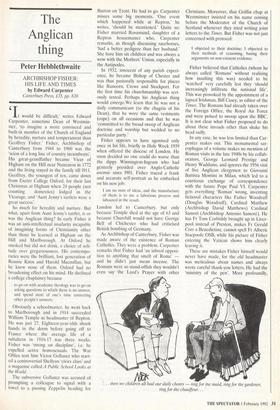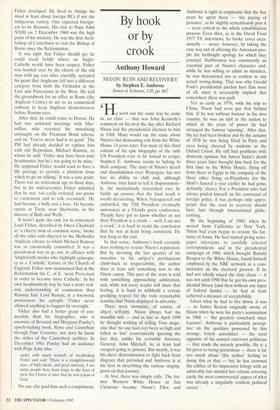The Anglican thing
Peter Hebblethwaite
ARCHBISHOP FISHER: HIS LIFE AND TIMES by Edward Carpenter Canterbury Press, .05, pp. 820 It would be difficult,' writes Edward Carpenter, sometime Dean of Westmin- ster, 'to imagine a more convinced and built-in member of the Church of England by heredity, nurture and temperament than Geoffrey Fisher.' Fisher, Archbishop of Canterbury from 1944 to 1960 was the 'scion of a long line of country incumbents'. His great-grandfather became Vicar of Higham on the Hill near Nuneaton in 1772 and the living stayed in the family till 1911. Geoffrey, the youngest of ten, came down from Exeter College Oxford, for their last Christmas at Higham when 24 people (not counting domestics) lodged in the Vicarage, and 'Aunt Jenny's tartlets were a great success'.
So much for heredity and nurture. But what, apart from Aunt Jenny's tartlet, is or was the Anglican thing? In early Fisher it was an anti-intellectual insularity incapable of imagining forms of Christianity other than those he learned at Higham on the Hill and Marlborough. At Oxford he smoked but did not drink, a choice of soli- tude over gregariousness. His contempo- raries were the brilliant, lost generation of Ronnie Knox and Harold Macmillan, but he knew none of them. Oxford had no broadening effect on his mind. He declined a college chaplaincy because
to go on with academic theology was to go on asking questions to which there is no answer, and spend most of one's time correcting other people's answers.
Obviously a schoolmaster, he went back to Marlborough and in 1914 succeeded William Temple as headmaster of Repton. He was just 27. Eighteen-year-olds shook hands in the dorm before going off to France where the average life of a subaltern in 1916-17 was three weeks. Fisher was 'strong on discipline', i.e. he expelled active homosexuals. The War Office sent him Victor Gollancz who start- ed a controversial Shellyan 'civics class' and a magazine called A Public School Looks at the World.
The subversive Gollancz was accused of prompting a colleague to signal with a towel to a passing Zeppelin heading for Burton on Trent. He had to go. Carpenter misses some big moments. 'One event which happened while at Repton,' he writes, 'should be mentioned.' Quite so: Fisher married Rosamund, daughter of a Repton housemaster who, Carpenter remarks, as though discussing racehorses, 'had a better pedigree than her husband.' She bore him six children and was always a wow with the Mothers' Union, especially in the Antipodes.
In 1932, innocent of any parish experi- ence, he became Bishop of Chester and was thus pastorally responsible for places like Runcorn, Crewe and Stockport. For the first time his churchmanship was seri- ously tested. Perhaps his Anglican thing would emerge.We learn that he was not a daily communicant (to the chagrin of his Dean), that he wore the same vestments (cope) on all occasions and that he was 'committed to the broad sweep of Anglican doctrine and worship but wedded to no particular party.'
Fisher appears to have agonised only once in his life, briefly in Holy Week 1939 when offered the diocese of London. He soon decided no one could do worse than the dippy Winnington-Ingram who had genteely presided over Anglo-Catholic anomie since 1901. Fisher traced a frank and accurate self-portrait as he embarked on his new job:
I am no man of ideas, and the manufacture of them is to me a laborious process and laboured in the result.
London led to Canterbury, but only because Temple died at the age of 63 and because Churchill would not have George Bell of Chichester who had criticised British bombing of Germany.
As Archbishop of Canterbury, Fisher was made aware of the existence of Roman Catholics. They were a problem. Carpenter remarks that Fisher had 'an inbred opposi- tion to anything that smelt of Rome' — and he didn't just mean incense. The Romans were so stand-offish they wouldn't even say the Lord's Prayer with other Christians. Moreover, that Griffin chap at Westminster insisted on his name coming before the Moderator of the Church of Scotland whenever they tried writing joint letters to the Times. But Fisher was not just concerned with protocol:
I objected to their doctrine; I objected to their methods of reasoning, basing their arguments on non-existent evidence.
Fisher believed that Catholics (whom he always called 'Romans' without realising how insulting this was) needed to be 'watched' very carefully lest they 'should increasingly infiltrate the national life'. This was provoked by the appointment of a lapsed Irishman, Bill Casey, as editor of the Times. The Romans had already taken over the Foreign Office, the Royal Air Force and were poised to swoop upon the BBC. It is not clear what Fisher proposed to do about these inroads other than shake his head sadly.
In any case, he was less limited than Car- penter makes out. This monumental sar- cophagus of a volume makes no mention of Roman visits in the late 1940s by his collab- orators, George Leonard Prestige and Henry Waddams, and ignores the 1956 visit of five Anglican clergymen to Giovanni Battista Montini in Milan, which led to a courteous exchange of correspondence with the future Pope Paul VI. Carpenter gets everything 'Roman' wrong, inventing fictional characters like Father Woodruff (Douglas Woodruff), Cardinal Matthew (Archbishop David Matthews) Cardinal Samori (Archbishop Antonio Samore). He has Fr Tom Corbishly brought up in Liver- pool instead of Preston, makes Fr Gerald Corr a Benedictine, cannot spell Fr Alberic Stacpoole OSB, while his picture of Fisher entering the Vatican shows him clearly leaving it.
These are mistakes Fisher himself would never have made, for the old headmaster was meticulous about names and always wrote careful thank-you letters. He had the 'ministry of the pen'. More profoundly, . then we chilc1rei all had our daily chores — ring for the maid, ring for the gardener, ring for the chauffeur. . . '
Fisher developed. He lived to change his mind at least about foreign RCs if not the indigenous variety. One expected foreign- ers to be Romans. His visit to Pope John XXIII on 2 December 1960 was the high point of his ministry. He was the first Arch- bishop of Canterbury to visit the Bishop of Rome since the Reformation.
It was right that Fisher should go; he could tread boldly where an Anglo- Catholic would have been suspect. Fisher was bowled over by the charm of the old man with jug ears who, crucially, accepted his point that Anglicans fell into a different category from both the Orthodox in the East and Protestants in the West. He laid the groundwork for an office in Rome (the Anglican Centre) to act as an ecumenical embassy to keep Anglican distinctiveness before Roman eyes.
After that, he could retire to Dorset. He had two awkward meetings with Mac- millan, who resented his moralising onslaught on the Premium Bond scheme and on 'You've never had it so good.' The PM had already decided to replace him with old Reptonian, Michael Ramsay, to whom he said: 'Fisher may have been your headmaster, but he's not going to be mine.' He supposed Fisher 'would want to have a life peerage to provide a platform from which to go on talking.' It was a sore point. There was no retirement age in those days, but in his mid-seventies Fisher admitted that he was 'too easily irritated, too prone to excitement and to talk overmuch.' He had become a bully and a bore. He became curate at Trent, near Sherborne, in the diocese of Bath and Wells.
It wasn't quite the end, for in retirement Lord Fisher, described by Owen Chadwick as 'a cheery man of common sense,' broke all the rules and objected to the Methodist Anglican scheme to which Michael Ramsay was so emotionally committed. It was a paradoxical way to go out, in alliance with Ampleforth monks who highlight episcopa- cy as a 'Catholic' feature of the Church of England. Fisher now maintained that at the Reformation the C. of E. 'went Protestant in order to become more Catholic'. In his own headmasterly way he had a more real- istic understanding of ecumenism than Ramsay had. Lord Runcie, in a foreword, pronounces his epitaph: 'Fisher never allowed anything to happen by oversight.'
Fisher also had a better grasp of ecu- menism than his biographer, who is unaware of Bernard and Margaret Pawley's
epoch-making book, Rome and Canterbury through Four Centuries, nor does he know the riches of the Canterbury archives. In December 1961 Pawley had an audience with Pope John who
spoke with much warmth of Archbishop Fisher and said: 'There is a straightforward man, of high ideals, and great sincerity. I see many people here from kings to the least of men; but 1 knew at once that he was a man of God.
No one else paid him such a compliment.



















































 Previous page
Previous page